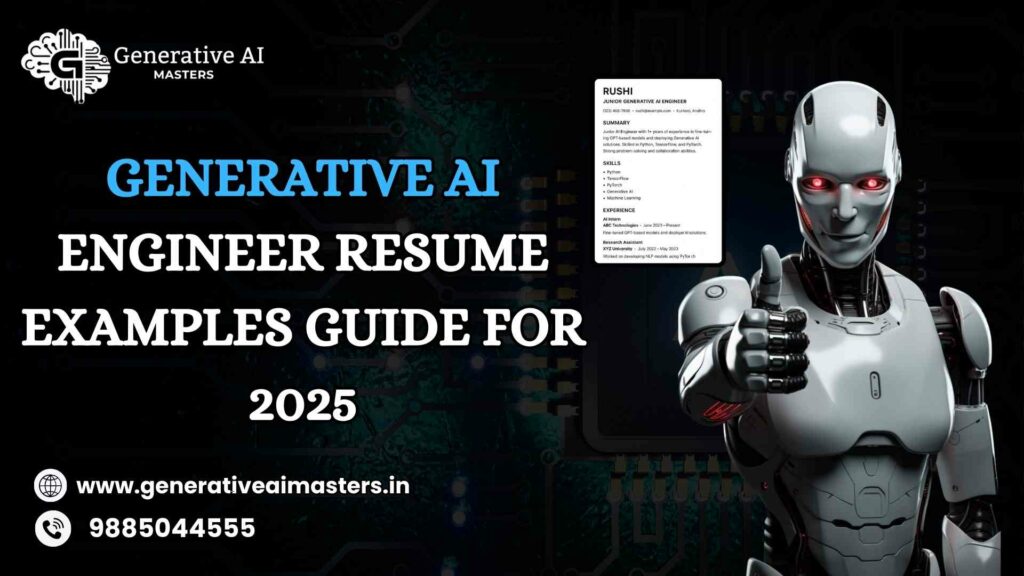Top Generative AI Engineer Resume -Examples Guide for 2026
How to Structure Your Generative AI Engineer Resume
When you apply for a Generative AI Engineer job, your resume is the first thing recruiters and HR will check. In India (Hyderabad, Bangalore, Pune, Chennai, Delhi NCR) and also abroad, most companies use ATS (Applicant Tracking System) to filter resumes. That means if your resume is not properly structured, it may never even reach the hiring manager.
So, learning how to structure your Generative AI Engineer resume is very important
1. Contact Information (Top Section)
Your contact details should be the first thing on your resume. Keep it simple
- Full Name
- Mobile Number (with India code +91 if applying abroad)
- Professional Email ID (avoid casual emails like coolguy123@gmail)
- City & Country (Example: Hyderabad, India)
- LinkedIn Profile / GitHub (if available)
This makes it easy for recruiters to call or email you.
2. Professional Summary (2–3 Lines)
Write a short summary that tells who you are, your experience, and what you want. Example:
“I am a Generative AI Engineer skilled in Python, NLP, and Large Language Models. I have built AI solutions for chatbots, data generation, and automation. Looking for opportunities in Hyderabad, Bangalore, or remote.”
Why important? Recruiters scan this first to know your value in 10 seconds.
3. Technical Skills (Keywords Section)
This is one of the most important parts. Use bullet points with exact skills
- Programming: Python, R, Java
- Frameworks: TensorFlow, PyTorch
- Generative AI: GPT, LLaMA, Stable Diffusion, MidJourney, LangChain
- Data Tools: SQL, Snowflake, Pandas
- Cloud: AWS, Azure, GCP
- Extra: Git, Docker, Kubernetes
Pro Tip: Adding these keywords improves your ATS score and helps in SEO optimization when recruiters search in job portals.
4. Work Experience (for Seniors) / Internships (for Freshers)
Structure your work like this
- Job Title – Company – Location – Years
- Write 3–4 achievements in bullet points.
Example: - Designed a customer support chatbot using GPT that reduced manual queries by 45%.
- Developed text-to-image models for a digital marketing team in Bangalore.
- Managed a team of 3 junior AI engineers.
If you are fresher, replace this with internships, hackathons, or college projects.
5. Projects Section (Very Important for AI Jobs)
Even senior engineers must show real AI projects. Example format:
- Project Name: AI-Powered Resume Screener
- Tools Used: Python, GPT-4, LangChain, Streamlit
- Result: Reduced resume screening time by 60% for HR teams.
Projects prove your hands-on experience, which recruiters in India and abroad value more than just certificates.
6. Education
- Degree (B.Tech, M.Tech, MCA, or related field)
- College/University Name
- Year of Passing
- Certifications: Example – Generative AI Masters Training in Hyderabad, Google AI Certification, Coursera AI Specialization.
If you studied in Hyderabad or Bangalore, mention it. Many Indian recruiters filter candidates by city.
7. Achievements & Extra Sections (Optional)
Add only if you have something special like:
- Research papers in AI/ML
- Open-source contributions (GitHub)
- Awards in hackathons or AI competitions
This gives extra weight to your profile.
8. Resume Format & Design (ATS-Friendly)
- Use simple fonts like Arial or Calibri
- Avoid heavy graphics, tables, or images
- Use clear headings and bullet points
- Save in PDF and Word formats
Remember: A stylish resume may look good to you, but ATS software might reject it if it’s not simple.
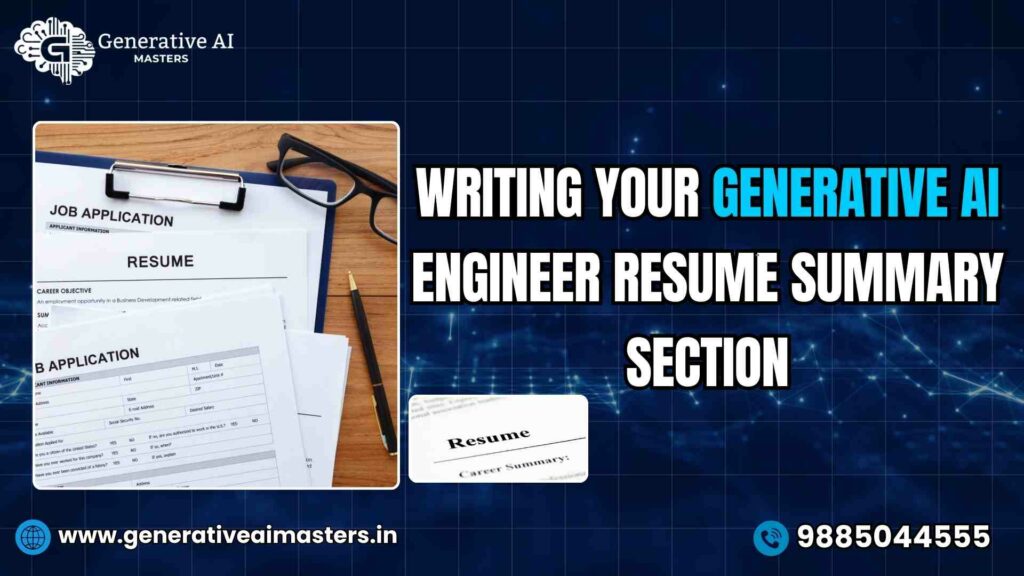
Writing Your Generative AI Engineer Resume Summary Section
The resume summary is one of the most important parts of your Generative AI Engineer resume. It is the first section that recruiters and HR managers read. In India (Hyderabad, Bangalore, Pune, Chennai, Delhi) and across the world, recruiters spend only 10–15 seconds scanning a resume. That means your summary must quickly show who you are, what you can do, and why you are the right candidate.
Why the Summary Section is Important?
- It gives a first impression of your profile.
- It tells recruiters your main skills in short.
- It helps your resume pass ATS (Applicant Tracking System) because it includes keywords like Generative AI Engineer, Python, NLP, Cloud, LLMs.
- It works for both freshers and experienced professionals if written correctly.
How to Write a Good Generative AI Resume Summary
- Keep it short → 2–4 sentences only.
- Add your job title → Always use Generative AI Engineer in the first line.
- Show main technical skills → Python, LLMs, TensorFlow, LangChain, etc.
- Mention experience level → Fresher, 2 years, or 10+ years.
- Show achievements or goals → Example: “Built AI models for chatbots” or “Looking for opportunities in Hyderabad.”
Examples of Resume Summaries
For Freshers (0–2 years)
“I am a Generative AI Engineer skilled in Python, NLP, and Large Language Models. I have built academic and internship projects like AI chatbots and text-to-image generators. Looking for opportunities in Hyderabad or Bangalore to apply my skills in real-time projects.”
For Mid-Level (3–6 years)
“Generative AI Engineer with 5 years of experience in NLP, Machine Learning, and AI model deployment. Skilled in GPT, TensorFlow, and LangChain, with proven success in building AI-driven chatbots and automation tools for startups in India.”
For Senior Professionals (7–15 years)
“Senior Generative AI Engineer with 12+ years of experience in Machine Learning, NLP, and Generative AI systems. Expert in designing and deploying LLM-based solutions, managing AI teams, and delivering business-focused AI products for clients in Hyderabad, Bangalore, and global markets.”
Generative AI Engineer resume sample Examples
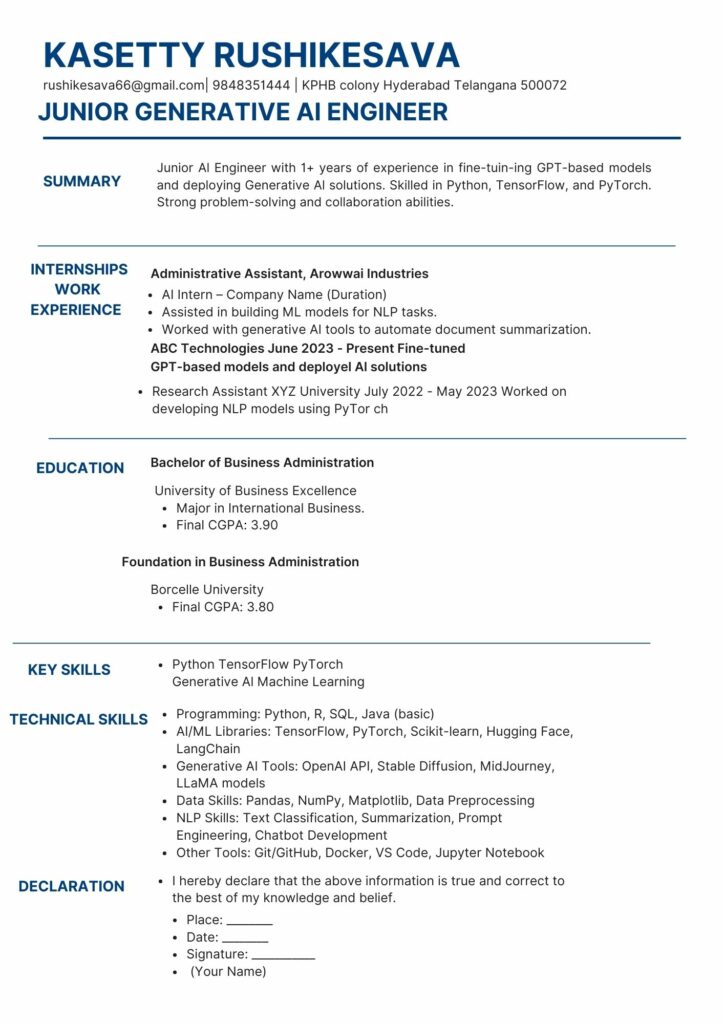
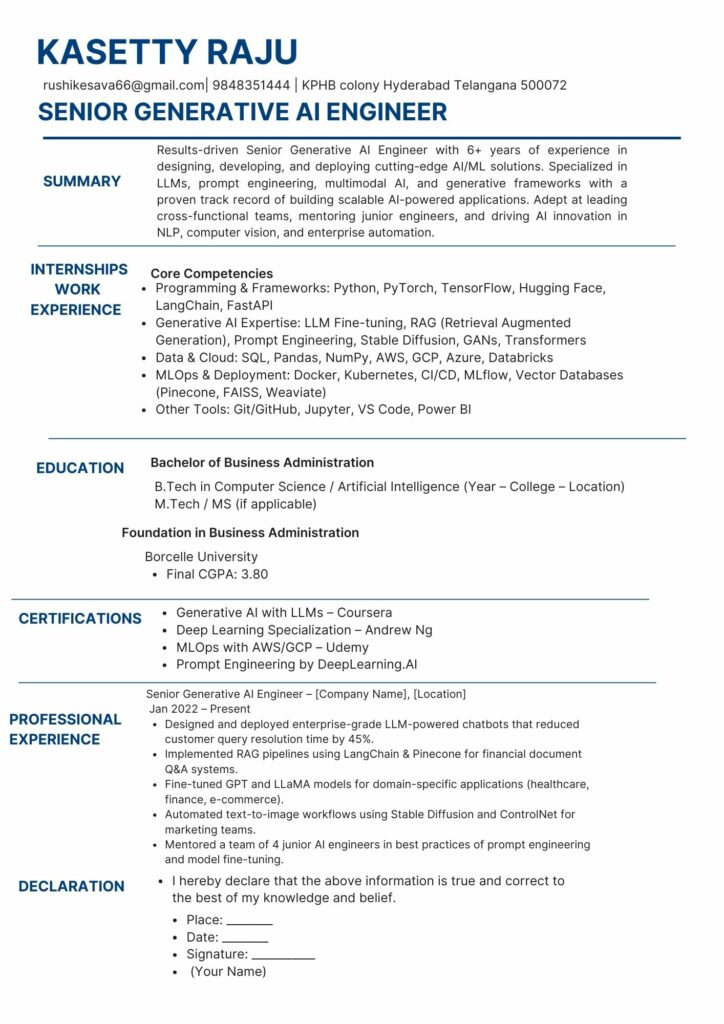
Listing Your Generative AI Engineer Skills on Your Resume
Why Skills Section is Important?
- Shows recruiters your core strengths in one glance.
- Increases chances of your resume appearing in job portal searches.
- Helps ATS software select your resume when recruiters search for keywords like Python, Generative AI, LLM, LangChain.
- Tells HR if you are a fresher, mid-level, or senior engineer.
How to List Your Skills
- Use bullet points instead of long sentences.
- Divide skills into categories for easy reading.
- Always include keywords from the job description.
- Keep the list updated with latest Generative AI tools.
Example Skill Categories for Generative AI Engineer Resume
Programming & Frameworks
- Python, R, Java
- TensorFlow, PyTorch, Keras
Generative AI & NLP
- Large Language Models (GPT, LLaMA, Falcon)
- LangChain, Hugging Face Transformers
- Text-to-Image Models (Stable Diffusion, MidJourney, DALL·E)
- NLP (Named Entity Recognition, Sentiment Analysis, Chatbots)
Data Engineering & Databases
- SQL, Snowflake, Pandas, NumPy
- Data Preprocessing & Feature Engineering
Cloud & Deployment
- AWS, Azure, Google Cloud
- Docker, Kubernetes, MLOps
Tools & Extra Skills
- Git, GitHub, Streamlit, FastAPI
- Synthetic Data Generation
Soft Skills (often ignored but important)
- Problem-Solving
- Teamwork & Collaboration
- Communication Skills
- Project Management
Best Hard Skills to Feature in Your Generative AI Engineer Resume
What are Hard Skills?
- Hard skills are technical, measurable, and job-specific skills.
- Example: Python programming, TensorFlow, GPT model training.
- These can be learned through training, projects, or certifications.
Best Hard Skills for Generative AI Engineer Resume
Programming Languages
- Python (must-have for all AI engineers)
- R (for data analysis and ML)
- Java / C++ (for scalable AI systems)
Machine Learning & Deep Learning Frameworks
- TensorFlow, PyTorch, Keras
- Scikit-learn, OpenAI API
- Hugging Face Transformers
Generative AI Tools & Models
- Large Language Models (GPT, LLaMA, Falcon)
- LangChain (for building AI pipelines)
- Stable Diffusion, MidJourney, DALL·E (for text-to-image)
- Synthetic Data Generation tools
Natural Language Processing (NLP)
- Text classification, Sentiment analysis
- Named Entity Recognition (NER)
- Building AI Chatbots
- Prompt Engineering
Data Engineering & Databases
- SQL, Snowflake, MongoDB
- Pandas, NumPy, Data Wrangling
- Feature Engineering
Cloud Platforms & Deployment
- AWS (SageMaker, Bedrock)
- Google Cloud AI, Vertex AI
- Microsoft Azure AI Services
- Docker, Kubernetes, MLOps pipelines
Extra Technical Tools
- Git, GitHub (version control)
- Streamlit, Flask, FastAPI (AI apps)
- APIs & Microservices
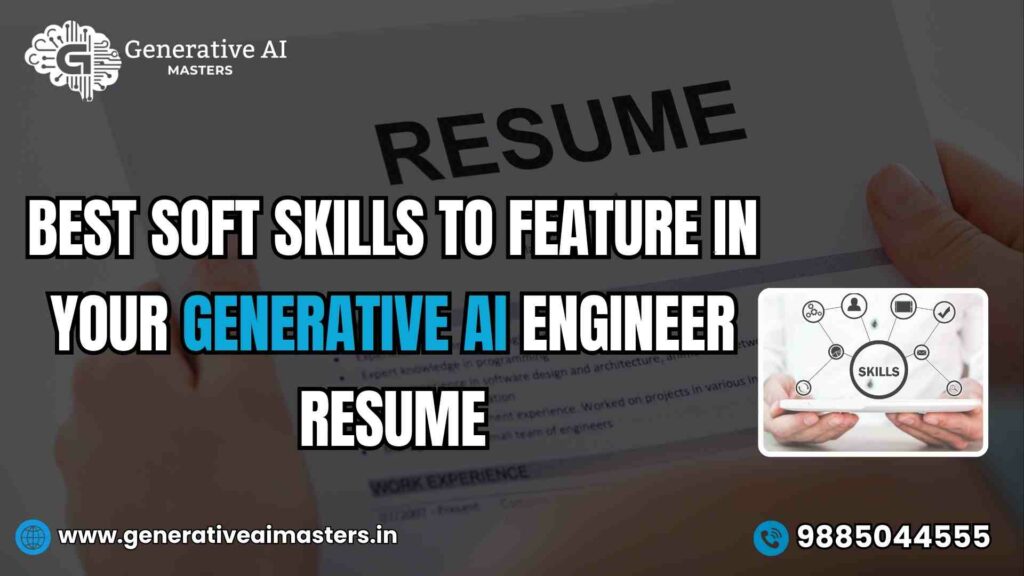
Best Soft Skills to Feature in Your Generative AI Engineer Resume
Why Soft Skills Matter in AI Jobs?
- Show recruiters you can work well in a team.
- Prove that you can explain complex AI topics in simple words.
- Highlight your ability to manage time and projects effectively.
- Help you stand out from other candidates who only list technical skills.
Best Soft Skills for Generative AI Engineer Resume
- Problem-Solving
Ability to analyze real-world problems and use AI models to create solutions. - Critical Thinking
Not just coding, but also questioning data quality, model accuracy, and ethical impact. - Creativity & Innovation
Generative AI is about creating new content. Recruiters love engineers who bring new ideas. - Communication Skills
Explaining AI results to non-technical people (like managers or clients) in simple words. - Teamwork & Collaboration
Working smoothly with other engineers, designers, and business teams in Hyderabad, Bangalore, or global companies. - Adaptability
Generative AI tools change fast (GPT-4, GPT-5, LLaMA, LangChain, etc.). You must be open to learning new things. - Time Management
Managing deadlines, especially when delivering AI solutions for startups or MNCs. - Leadership (for seniors)
Guiding junior AI engineers, handling projects, and making decisions for AI product development. - Ethical Thinking
Generative AI must be used responsibly. Recruiters value candidates who consider AI bias, fairness, and privacy. - Continuous Learning
Showing that you always keep up with the latest AI research, courses, and certifications.
How to Include Your Education on Your Resume
Why Education Section is Important?
- It shows recruiters your academic background.
- Helps HR know if you studied in a relevant field like Computer Science, IT, or AI.
- For freshers, it may be the strongest part of the resume.
- Adds extra weight if you studied at a well-known university or did AI certifications.
Where to Place Education in Your Resume?
- Freshers & Students → Put Education at the top, just after your Summary.
- Experienced Professionals → Place Education after Work Experience.
How to Structure Your Education Section
Always follow this simple order
- Degree / Qualification
(B.Tech in Computer Science, MCA, M.Tech in Artificial Intelligence, etc.) - University / College Name + Location
(Example: JNTU Hyderabad, Osmania University, IIT Delhi) - Year of Passing (or Expected Year)
(Example: 2023, or Expected 2026) - Optional – Marks / CGPA (only if good, like above 70%)
Example for Freshers
Education
- B.Tech in Computer Science – JNTU Hyderabad – 2023 – CGPA: 8.2/10
- Certification: Generative AI Masters Training, Hyderabad (2024)
- Certification: Google Generative AI Professional Certificate (2024)
Example for Experienced Professionals
Education
- M.Tech in Artificial Intelligence – IIT Delhi – 2015
- B.Tech in Information Technology – JNTU Hyderabad – 2012
- Extra Certifications: Coursera Generative AI Specialization (2023), AWS AI/ML Certification (2022)
How to Include Generative AI Engineer Certifications on Your Resume
Why Certifications Matter?
- They prove your skills with AI tools like GPT, LangChain, Stable Diffusion, etc.
- Help your resume pass ATS filters (when recruiters search with keywords like “Generative AI Certification”).
- Show that you are serious about your career growth.
- Add extra weight to your resume when competing with others.
Where to Place Certifications on Resume?
- Freshers → Add certifications just below education.
- Experienced Professionals → Add certifications after work experience or in a separate section.
- If the job description specifically asks for certifications, place them higher in the resume.
How to List Certifications
Use a clear and consistent format
- Certification Name – Issuing Organization – Year Completed
Example
- Generative AI Masters Certification – Hyderabad – 2024
- Google Cloud Generative AI Professional Certificate – Google – 2024
- OpenAI API Developer Certification – OpenAI – 2023
- Coursera Specialization in Generative AI with LLMs – Coursera – 2023
Tip: If it’s an online course, add the platform name (Coursera, Udemy, LinkedIn Learning).
Common Responsibilities Listed on Generative AI Engineer Resume
Why Responsibilities Are Important?
- They tell the recruiter what day-to-day tasks you can do.
- Show your practical knowledge of Generative AI tools.
- Help your resume stand out in job searches with the right keywords.
- Answer recruiter’s AEO-style questions like:
- “Can this candidate build AI models?”
- “Do they know about LLMs, Python, and cloud platforms?”
Common Responsibilities for Generative AI Engineer Resume
- Develop and fine-tune Generative AI models such as GPT, Stable Diffusion, and LLMs.
- Design and train deep learning models using Python, TensorFlow, or PyTorch.
- Work on Natural Language Processing (NLP) tasks like text generation, summarization, and translation.
- Create AI-powered applications for chatbots, recommendation systems, or content creation.
- Optimize AI models for speed, accuracy, and cost efficiency.
- Use cloud platforms like AWS, Azure, or Google Cloud for deploying AI solutions.
- Analyze datasets to train and improve AI models.
- Collaborate with data scientists and developers to build scalable AI solutions.
- Research new AI methods and apply the latest innovations in Generative AI.
- Ensure ethical AI practices like bias control and safe AI usage.
Extra Sections to Include in Your Generative AI Engineer Resume
Why Extra Sections Are Important?
- They make your resume unique compared to other candidates.
- Show that you are not only skilled but also creative, motivated, and updated.
- Help recruiters quickly see extra value you bring to the company.
- Increase your chances of passing ATS filters with more keywords.
Extra Sections You Can Add
1. Projects Section
- Mention real-time AI or ML projects you worked on.
- Include GitHub links, Kaggle competitions, or demo websites.
- Example: “Developed a Generative AI chatbot for e-commerce in Hyderabad using GPT and Python.”
2. Publications & Research
- If you wrote papers, blogs, or case studies, list them here.
- Example: “Published research on ethical AI in healthcare, IEEE Journal, 2024.”
3. Awards & Achievements
- Highlight hackathons, coding competitions, or company awards.
- Example: “Winner – AI Hackathon, IIT Hyderabad, 2023.”
4. Certifications (Detailed)
- List industry-recognized certifications like:
- Google Cloud Generative AI Certificate
- Generative AI Masters Hyderabad Certification
- AWS AI/ML Specialty
5. Open Source Contributions
- If you contributed to GitHub repositories, mention it.
- Example: “Contributed to Hugging Face Transformers library (2024).”
6. Languages (Programming & Human)
- Example: Python, R, JavaScript, SQL, Telugu, Hindi, English.
- This shows both technical strength and communication ability.
7. Volunteer Work
- AI-related community work adds credibility.
- Example: “Mentored students on AI basics through Hyderabad AI Community.”
8. Professional Affiliations
- Membership in AI clubs or societies.
- Example: “Member – Data Science Society, Hyderabad.”
Which Resume Format to Choose for a Generative AI Engineer?
Main Resume Formats You Can Use
1. Reverse Chronological Resume (Most Popular)
- What it is: Lists your work experience first, starting from the most recent job.
- Best for
- Experienced professionals (2+ years).
- Candidates with strong career growth.
- Why good for AI Engineers: Shows how your experience has improved over time.
Example Section Order
- Contact Information
- Resume Summary
- Work Experience
- Education
- Skills
- Certifications & Projects
2. Functional Resume (Skills-Based)
- What it is: Focuses on skills and projects, not job history.
- Best for:
- Freshers / recent graduates.
- People shifting careers into Generative AI.
- Why good for AI Engineers: Highlights technical skills like Python, LLMs, Generative AI tools, even if you have less job experience.
- Example Section Order:
- Contact Information
- Resume Summary
- Skills (Hard + Soft)
- Projects & Certifications
- Education
3. Combination Resume (Hybrid Format)
- What it is: Mixes skills + work experience.
- Best for:
- Mid-level professionals (1–5 years of experience).
- Candidates who want to show both projects and job history.
- Why good for AI Engineers: Perfect if you have real Generative AI projects + some professional work experience.
- Example Section Order:
- Contact Information
- Resume Summary
- Skills (Grouped by category – AI, Programming, Cloud, etc.)
- Projects
- Work Experience
- Education
- Certifications
Conclusion
A well-structured Generative AI Engineer Resume is the key to getting noticed in today’s competitive job market. Whether you are a fresher in Hyderabad or Bangalore, a mid-level professional in Pune or Chennai, or an experienced AI engineer aiming for global roles, your resume must highlight the right skills, projects, certifications, and responsibilities. Choosing the correct resume format (functional, combination, or reverse chronological) depends on your experience level, but keeping it ATS-friendly, keyword-rich, and clear is always important. Extra sections like projects, research, awards, and open-source contributions add more value and help recruiters see your real-world impact. Remember, recruiters are looking for both technical strength (Python, LLMs, Generative AI tools, cloud platforms) and soft skills (problem-solving, teamwork, creativity). By carefully organizing your education, certifications, and achievements, and by writing everything in simple, action-focused points, you can make your Generative AI Engineer resume stand out in India and abroad.
FAQS
1. What is the best resume format for a Generative AI Engineer?
The best format depends on your experience
- Freshers → Functional format (skills and projects first).
- Mid-level (1–5 years) → Combination format (skills + experience).
- Experienced (5+ years) → Reverse chronological format (work history first).
No matter the format, keep it simple, ATS-friendly, and easy to read.
2. How do I write a strong summary for a Generative AI Engineer resume?
Write 3–4 lines that highlight your key skills, years of experience, and specialization. Example:
“Generative AI Engineer with 3+ years of experience in building AI models, LLMs, and NLP solutions. Skilled in Python, TensorFlow, and cloud AI deployment.”
3. What hard skills should I add to my Generative AI Engineer resume?
Hard skills are technical skills. Add: Python, TensorFlow, PyTorch, Generative AI models (GPT, Stable Diffusion), NLP, LangChain, SQL, Cloud AI (AWS, Azure, GCP).
4. What soft skills are important for a Generative AI Engineer?
Soft skills show how you work in a team. Add: Problem-solving, communication, teamwork, creativity, critical thinking, adaptability, and attention to detail.
5. How do I list projects on my resume?
Create a separate “Projects” section. Example
- “Built Generative AI chatbot using GPT API for customer support.”
- “Developed AI image generator with Stable Diffusion for e-commerce.”
Include project name, tools used, and outcome.
6. Where should I place certifications on my resume?
- Freshers → Place certifications just after education.
- Experienced professionals → Place them after work experience.
Always write: Certification Name – Organization – Year.
7. Which certifications are best for Generative AI Engineers in India?
- Generative AI Masters Certification – Hyderabad
- Google Cloud Generative AI Certificate
- AWS Machine Learning Specialty
- OpenAI API Developer Certificate
- Coursera Generative AI with LLMs
8. How long should a Generative AI Engineer resume be?
- Freshers → 1 page is enough.
- Experienced professionals → 2 pages maximum.
Recruiters prefer short, clear, and keyword-rich resumes.
9. What responsibilities should I write in my resume?
Include tasks like
- Designing and training AI models.
- Fine-tuning LLMs.
- Creating AI-powered apps like chatbots.
- Deploying models on cloud.
- Researching new AI methods.
10. How can freshers write a Generative AI Engineer resume without experience?
Focus on
- Projects (college, personal, GitHub).
- Certifications.
- Skills (programming + AI tools).
Internships or hackathons.
Instead of experience, highlight practical learning and achievements.
11. What keywords should I use to make my resume ATS-friendly?
Use keywords like: Generative AI, LLM, GPT, Python, TensorFlow, PyTorch, NLP, Machine Learning, AI Engineer, Cloud AI, LangChain, Stable Diffusion.
12. Should I include GPA or marks in my resume?
- Yes, if you are a fresher with strong academic results.
- Not needed if you have 2+ years of experience.
13. How to show open-source contributions on resume?
Add an “Open Source Contributions” section. Example:
- “Contributed to Hugging Face Transformers Library (2024).”
- “Maintained AI models on GitHub with 500+ stars.”
14. Do recruiters in Hyderabad and Bangalore look for local certifications?
Yes. In India, recruiters prefer local or recognized programs like IIT Hyderabad, IIIT Bangalore, or top training institutes like Generative AI Masters Hyderabad. Mention them clearly.
15. Should I add extra sections in my resume?
Yes. Extra sections make your resume stand out. Add
- Projects
- Awards & Achievements
- Publications / Blogs
- Languages
- Volunteer Work
16. How do I highlight cloud AI experience?
Write in work experience or skills section
- “Deployed Generative AI models on AWS SageMaker.”
- “Used Google Cloud Vertex AI for LLM applications.”
17. How can I show teamwork in a resume?
Add a bullet like
- “Collaborated with a team of 5 engineers to build an AI-powered recommendation system.”
This shows you work well with teams.
18. What mistakes should I avoid in my resume?
- Too many pages.
- Long paragraphs instead of bullet points.
- Irrelevant skills or projects.
- No keywords (resume won’t pass ATS).
Spelling/grammar mistakes
19. Should I customize my resume for each job?
Yes. Always read the job description and match your skills, responsibilities, and projects with keywords used by the company. This increases interview calls.
20. How can a Generative AI Engineer resume help me get jobs abroad?
- Use a combination format (skills + experience).
- Highlight global certifications like Google, AWS, Coursera.
- Show projects with real-world results.
- Write in clear, simple English.
Recruiters in US, UK, and Canada prefer resumes that are direct and result-focused.

